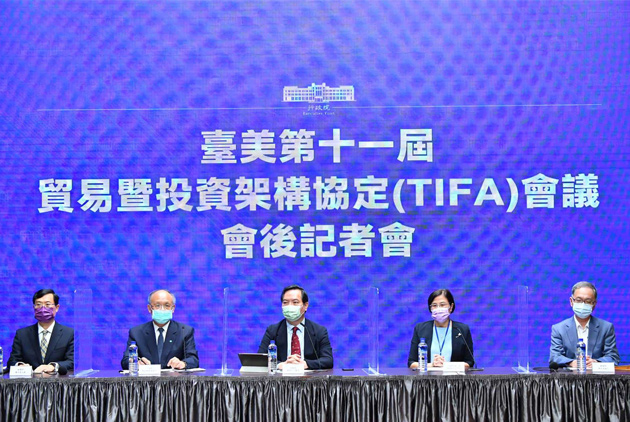The Rundown: Long-stalled TIFA Talks Resume in Late June

Source:Executive Yuan
A weekly snapshot of Taiwan business news stories brought to you by CommonWealth and AmCham Taiwan’s TOPICS.
Views
The Rundown: Long-stalled TIFA Talks Resume in Late June
By CommonWealth/AmCham Taiwan’s TOPICSweb only
Long-stalled TIFA Talks Resume in Late June
The 11th Taiwan-US Trade & Investment Framework Agreements (TIFA) council meeting was convened virtually on June 30. It was the first such meeting to be held in nearly five years, and was led by Yang Jen-ni, Deputy Chief Negotiator of Taiwan’s Office of Economic and Trade Negotiations (OTN), and Assistant U.S. Trade Representative for China Affairs Terrence J. McCartin.
It is widely believed that one of the main reasons for the TIFA’s hiatus was Taiwan’s long-running ban on imports of U.S. pork containing ractopamine. Last August, President Tsai Ing-wen announced that starting from 2021, such imports would be permitted and on January 1, the ban was lifted.
The Executive Yuan in a statement released after the meeting noted that the U.S. recognizes Taiwan’s efforts to comply with international standards. Both sides have agreed to work within the TIFA framework to maintain communication among its agricultural working group, reduce trade barriers, and expand agricultural markets in the U.S. and Taiwan.
Deputy Chief Negotiator Yang said that international trade-related topics such as labor, supply chain issues, and simplifying vaccine import procedures were also discussed. She also emphasized that this meeting has a positive effect on U.S.-Taiwan economic and trade relations and hopes that in the future, both sides will work to strengthen the close contact among all working groups under the TIFA framework.
The U.S. acknowledged Taiwan’s desire to sign a Bilateral Trade Agreement (BTA) and agreed that TIFA meetings aid the U.S.-Taiwan economic relationship.
Markets Begin Conditional Reopening Across Taiwan
 (Source: Ko Wen-je's Facebook)
(Source: Ko Wen-je's Facebook)
As Taiwan enters its eighth week of COVID-19 restrictions, a decline in daily confirmed case numbers has given residents hope that the Level 3 alert will soon be downgraded. Following several consecutive days of fewer than 100 new confirmed cases, public markets are gradually allowing vendors and customers to return.
While night markets and traditional markets were not on government’s list of business forced to close after to an outbreak of local infections began in mid-May, many of them opted to shut voluntarily.
On June 30, Central Epidemic Control Center (CECC) commander Chen Shih-chung announced that guidelines for reopening traditional markets, catering businesses, and night markets are forthcoming. The CECC will consult with relevant authorities to implement control measures, Chen added.
The Ministry of Economic Affairs (MOEA) has said that in addition to strictly adhering to orders prohibiting on-site dining, vendors must also keep records of their staff. Furthermore, night market management must designate entrances and exits and maintain appropriate limits on entrants to ensure social distancing. Local governments will dispatch personnel to check whether night markets are complying with disease prevention protocol.
The MOEA stated that it will not rule out levying fines and suspending the operations of markets with insufficient control measures and will discuss implementation details with local governments.
Meanwhile, cluster outbreaks at three wholesale markets in Taipei have led to expanded PCR and rapid testing, and around 250 cases linked to these outbreaks have been reported.
Capital Requirements Eased to Facilitate Lending
 (Source: CommonWealth Magazine)
(Source: CommonWealth Magazine)
In order to mitigate the effects of the COVID-19 pandemic on Taiwan’s domestic economy and expand the lending capacity of local banks, the Financial Supervisory Commission (FSC) announced on July 1 that banks would postpone implementation of the Basel III capital accord. In addition, minimum capital requirements for Taiwan’s six Domestic Systemically Important Banks (D-SIBs) have been reduced by 0.5%. The FSC’s Banking Bureau estimates that this reduction could allow the D-SIBs to increase lending capacity by NT$400 billion, with each bank now able to lend NT$70-80 billion more than was previously possible.
Banking Bureau Chief Secretary Phil Tong noted that to assist banks with investing resources in extending credit to businesses and individual the FSC recently called a meeting with the D-SIBs. During the meeting, the two sides reached a consensus on two major items regarding postponement of Taiwan’s alignment with international standards on capital requirements.
Tong said that as of March this year, D-SIBs must adhere to capital requirements in three categories. CTBC Bank, Cathay United Bank, Fubon Bank, and Taiwan Cooperative Bank have already met those requirements in full, while Mega International Commercial Bank and First Commercial Bank will not meet them until 2023.
Translated by Julia Zhou
Edited by Jeremy Olivier
Uploaded by Penny Chiang






